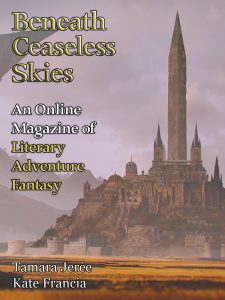Karen Burnham Reviews Short Fiction: Beneath Ceaseless Skies, Clarkesworld, Strange Horizons, Lightspeed, and Hexagon
 Beneath Ceaseless Skies 9/9, 9/23/21
Beneath Ceaseless Skies 9/9, 9/23/21
While Beneath Ceaseless Skies doesn’t typically do theme issues, the fact that each features a pair of stories lets us find synchronous themes pretty often. Issue #338 features two young people facing very different coming-of-age trials. In “The Shape of Wings and Feathers” by Jenny Rae Rappaport, Bryce is a young girl who is facing the most dangerous trial set by her magicians’ school. Her magical development has been far outside the norm, including travel to different realms where she befriends Granny, who teaches her the magic of giants. Bryce is trapped in a magical dome filling with acid and has to win through the trial, but as she becomes more desperate she also becomes less bound by convention; at the same time Granny is doing whatever she can to help from another angle. I found the choice of ending quite strange, as it focuses on Granny’s hope rather than what physically happens to Bryce, but the story is absolutely engaging throughout. “Those Virtues, These Poisons” by Martin Cahill, in contrast, features Pano, who usually relies on the help of his twin brother Rohi. But in this trial where they both receive poison from a twin headed god-snake, Rohi is paralyzed and it is up to Pano to return him safely while under the influence of powerful hallucinogenic venom. Pano has to travel through visions of many people telling him how he’ll fail, which completely reinforces his own beat-down sense of himself. He’ll need a breakthrough in order to have any chance of success.
Issue #339 brings us two stories of strong female relationships that bloom in the context of monastic devotion. “In Case You’re the One to Devour a Star” by Tamara Jerée centers on Olin, a fire keeper who falls in love with and marries Lilist. Lilist is a poet who is excited to go to Olin’s monastery and meet the dragon that lives there, a dragon that has traveled through the stars and brought a form of magic to the world. Lilist starts to enshrine the dragon’s story in a way that might act as a bridge from the monastery to the civilian population that doesn’t understand; the descriptive language here is lush and beautiful. In “A Bird in the Window” by Kate Francia Marguerite is a young woman who keeps seeing “angels” all around her vision and suffering fits that sound like epilepsy, but in the context of a historical European abbey, she can only think of it as divine torment. Beatrix is at the abbey to discreetly have an out-of-wedlock child; she is much bolder than the timid Margueritte. As the pregnancy threatens Beatrix’s life Margueritte starts to embrace and harness the potential that the angels can bring her, leading her away from fear.
I continue to enjoy Ray Nayler’s work, which is obviously influenced by his time in foreign service. In September’s Clarkesworld, his story “Yesterday’s Wolf” introduces us to Elmira, a young woman with a talent for technology, which her father encourages. That’s radical in a society where kidnapping and rape is one of the most common paths to marriage. The landscape is littered with detritus from past wars. Elmira is able to take a broken-down patroller and reprogram it to guard the family’s sheep. When others try to do the same they don’t realize what they’re working with, and instead one of the warbots goes back into search and destroy mode. The fact that Elmira’s machine is one of the only things that can protect people gives her a lot of leverage to secure her future, whatever she wants it to be. Other stories here more firmly put their science fictional premises in service of character development. In “It Is a Pleasure to Receive You” by Ziggy Schutz Simon is the lone crew member on a communications relay satellite. Although Simon’s role is supposed to be neutral, just cleaning up garbled messages and passing them on, in two instances he instead answers individuals, Lyric and Nova, who were essentially shouting into the void. They form bonds that may be strong enough to call Simon down from his lonely outpost. “The Winter Garden” by Regina Kanyu Wang (translated by Emily Jin) imagines Teacher Wang, a person who by her own admission is almost incapable of making decisions, instead either waiting until decisions become moot or letting the status quo ride as long as she can. Wang is finally motivated to take advantage of the alternate dimensional travel developed by the lab where she works to find herself living in Dublin instead of China because she made different choices. They meet, and talk, and Wang’s relationship with herself takes unexpected turns that might threaten the integrity and sanity of her alternate’s universe.
Strange Horizons has a strong set of short stories in August. “Cocoon” by H. Pueyo is very dark, imagining a young man who sticks with his grandmother as she becomes ever more encased by the cocoon of the title. He’s terrified by the transformation that she might be going through, but there are worse fates he might discover. I’d like to give this story credit for adding “urticating” to my vocabulary. P.H. Low brings us “The Loneliness of Former Constellations”, an interesting blend of fantasy and science fiction. Hedi is what remains of a powerful space warrior, decommissioned and in constant pain. Alanna is a young warrior, wounded when she fails to defeat a powerful foe. They live together for a time, and there’s magic of both the fantastic kind and the healing kind as two women warriors support each other, with the ending opening up new possibilities for both of them. “All Us Ghosts” by B. Pladek imagines a near future where rich families pay a service to perfectly craft a virtual social scene for their sheltered children before they go to college. Jude is writing and acting the parts of all of Cam’s friends, even though Jude is living in squalor outside of the manicured compounds of the elite. Cam falls in love with Jude’s creation Julian, and Jude uses the connection to get information to help sue the company that employs them and get at least some improvement in working conditions. But you can’t play on the emotions of the young and powerful and not expect some blowback, no matter how noble the intentions.
The fantasy side of the October issue of Lightspeed brings us a novelette by PH Lee & Rachel Swirsky, continuing their Dusty Boots series of fairy tale-style stories. “The Ash-Girl and the Salmon Prince” blends Cinderella tropes with The Fisherman and His Wife and a hint of Bluebeard. The ash-girl is so ignored by her parents in favor of her two beautiful sisters that when the father saves the life of a magic salmon, who requests a wife in order to grant them more wishes, they’re more than happy to send this youngest girl to him. Luckily she and the salmon are a wonderful match and live very happily together. Twice she starts to miss her family and decides to visit them, and both times her mother reminds us and her just what a horrible person she is. The salmon can barely imagine why his wife still cares for these people, but very much wants her to be happy. In the end there may be a way to fulfill everyone’s wishes, but can the mother bend so far? I’ve been enjoying all the Dusty Boots stories, and this is honestly less dark than some of the others. The flash piece is “The Right Dragon” by Coral Alejandra Moore. A blacksmith is deeply in love with Marisol, a woman who lost an arm and a sister to a dragon. The blacksmith follows her as she dispatches dragon after dragon, but apparently none were the right one – until the last? The narration is deeply felt.
Hexagon is a new-to-me venue that I’m picking up with issue six. It has an interesting range of authors and stories. “Raised Bed” by Noah Codega mixes tones very effectively. A man is turning into a garden, with different plants and vegetables growing out of him and displacing or puncturing his various organs. While the descriptions are vivid and horrific, the narrator is quite at peace with what’s happening to him. But what will happen after a harvesting? It’s the Anthropocene writ in miniature. “The Hole in the System” by E.C. Fuller imagines holes manifesting randomly throughout the world. Nadia had been an aspiring opera singer before a hole appeared in her throat; now she’s working at a grocery store and trying to figure out how to pay for the medical treatment her husband will need to fix the one that appeared in a vital organ. The system is pretty clearly failing them and there’s no neat resolution. Finally, in “Your Body is a Doorway” by L Chan, Kai is living in a city that is repeatedly devastated by the monster Gargantuan. Kai is the vessel through which its nemesis, a tentacular creature that frankly wreaks just as much havoc, appears each time to drive Gargantuan away. Even if the Far Church that put Kai in this role has ceased to exist, could there be others out there like himself? Even when dealing with literal monsters, it is human contact that matters most.
Recommended Stories
“In Case You’re the One to Devour a Star”, Tamara Jerée (Beneath Ceaseless Skies #339)
“The Ash-Girl and the Salmon Prince”, PH Lee & Rachel Swirsky (Lightspeed 10/21)
“The Loneliness of Former Constellations”, P.H. Low (Strange Horizons 8/9/21)
“Yesterday’s Wolf”, Ray Nayler (Clarkesworld 9/21)
Karen Burnham is an electromagnetics engineer by way of vocation, and a book reviewer/critic by way of avocation. She has worked on NASA projects including the Dream Chaser spacecraft and currently works in the automotive industry in Michigan. She has reviewed for venues such as Locus Magazine, NYRSF, Strange Horizons, SFSignal.com, and Cascadia Subduction Zone. She has produced podcasts for Locusmag.com and SFSignal.com, especially SF Crossing the Gulf with Karen Lord. Her book on Greg Egan came out from University of Illinois Press in 2014, and she has twice been nominated in the Best Non-Fiction category of the British SF Awards.
This review and more like it in the November 2021 issue of Locus.
 While you are here, please take a moment to support Locus with a one-time or recurring donation. We rely on reader donations to keep the magazine and site going, and would like to keep the site paywall free, but WE NEED YOUR FINANCIAL SUPPORT to continue quality coverage of the science fiction and fantasy field.
While you are here, please take a moment to support Locus with a one-time or recurring donation. We rely on reader donations to keep the magazine and site going, and would like to keep the site paywall free, but WE NEED YOUR FINANCIAL SUPPORT to continue quality coverage of the science fiction and fantasy field.
©Locus Magazine. Copyrighted material may not be republished without permission of LSFF.








